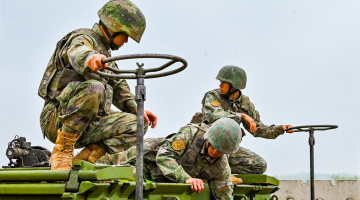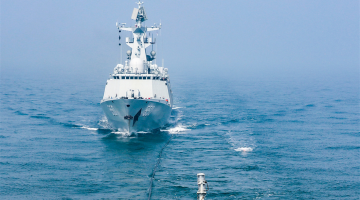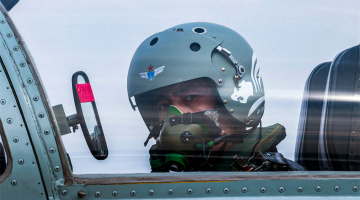By Luo Yuan
Through the modern history of the Chinese nation, it was once faced with four crises imposed by external forces. How did the Communist Party of China (CPC) lead the Chinese people to conquer them and move forward?
First, the Chinese People’s War of Resistance Against Japanese Aggression. Back then, there were two prevalent public views on the war. One was the “theory of national subjugation.” Its followers believed that considering its weaker national strength, China would perish if fighting against Japan, so it was better to compromise or concede. The other was the “theory of quick victory.” However, Mao Zedong concluded that the war of resistance against Japanese aggression would be a “protracted war” and “the final victory will belong to China.” He pointed out that most importantly, the invasive war launched by Japan was unjust, which would definitely intensify the class opposition within Japan, the antagonism with Chinese nation and the confrontation with most countries in the world, which constituted the primary reason for Japan’s inevitable defeat.
Of course, the enemy would not fail for nothing. We must implement a correct strategy, that is, “to actively, flexibly and systematically carry out tactical offensives within the strategic defensive, fight campaigns and battles of quick decision within a strategically protracted war.” Mao called for maximally mobilizing the Chinese people. “The mobilization of the common people throughout the country will create a vast sea in which to drown the enemy, create the conditions that will make up for our inferiority in arms and other things, and create the prerequisites for overcoming every difficulty in the war,” he said.
Second, the War of Resisting US Aggression and Aiding Korea. Soon after the founding of the People’s Republic of China in 1949, many things were waiting to be done. However, Americans brought the war to the threshold of Chinese people. Fight back or not? This was a major strategic decision that the Chinese leadership had to make at the time. There were two kinds of opinions: some suggested that China should stand by or delay sending troops to the DPRK, while others actively advocated of sending troops. After repeated and meticulous considerations, the CPC Central Committee finally decided to dispatch troops to Korea to help it “resist US aggression and defend the homeland.”

After five campaigns, Chinese and DPRK armies drove the US troops, the world’s largest military power, back across the 38th Parallel from the bank of the Yalu River. The war fell into a stalemate. Relying on its advantageous naval and air forces, the US arrogantly claimed, “Let our bombs, artillery and airplanes take a part in the negotiation,” threatening the Chinese and Korean sides to concede a land of 12,000 square kilometers as a “compensation for its naval and air advantages.” Mao gave a flat refusal, saying that “we’ll accept if the US wants to negotiation; we’ll be there if the US wants to fight.” After several rounds of battles and negotiations, China eventually won the victory in the war of resisting US aggression and aiding Korea. Facts show that what is not available on the battlefield is hard to get at the negotiating table.
Third, “two bombs and one satellite.” In the early days of the New China, the nation remained weak. In this context, US resorted to “nuclear blackmail” and “nuclear threat” against China. At that time, China’s then ally, the Soviet Union, also broke its promises by retreating experts and terminating contracts. China was faced with an unprecedented international embargo. However, the Chinese people tightened their belt and devoted themselves to research in the world scientific frontiers. Starting from scratch, they eventually developed China’s own strategic nuclear weapons through independent efforts, enabling the nation to rank among major nuclear countries in the world. It took China only two years and eight months from the first atomic bomb to the first hydrogen bomb, much shorter than the time used by the US, the Soviet Union and France. History proves what Mao said: “Imperialists, just embargo China! After a century of embargo, we’ll have everything we need.”
Fourth, the US bombing of the Chinese embassy in Belgrade and the China-US mid-air collision. At the beginning of China’s reform and opening up, the nation needed to pool manpower, funds and resources to develop the economy. In this context, the US took the opportunity to provoke China repeatedly. The Yinhe incident in 1993, the US bombing of the Chinese embassy in Belgrade in 1999 and the aircraft collision in 2001 demonstrated again and again that “lagging behind leaves one vulnerable to attacks.” Subsequently, with the improvement of China’s overall national strength and the need of safeguarding national security, China gradually adjusted its defense guideline from “the military must endure” and “national defense must give way to national economic development”, to “national defense must achieve synchronous and coordinated development with economic development.”
The hegemonic moves of the US, including embargo, bombing of the Chinese embassy and aircraft collision, “forced” China to launch a number of projects that make Chinese people feel proud. It can be said that many important weapons and equipment of the Chinese military were the product of the reverse force of the US. In my opinion, the trade war initiated by the US will “force” China to realize something proud-worthy, too. The emergence of products and strategic supporting industries in which China has independent intellectual property rights, represented by chips, will be just around the corner. Our capacity and self-confidence will be perfectly embodied in the China-US trade war.
The strategic races between China and the US revealed that China must have a strong core leadership and correct strategic guidance. The Chinese people must united and overcome challenges together, and defy the enemy strategically while paying enough attention to the enemy tactically. In addition to seeking external assistance, we should depend on our own efforts and work hard to achieve our goals. As long as we do our own jobs well, bad things will turn into good things and the stress will become a driving force. No matter what difficulties we face, we will always be invincible, and no enemy can defeat us.
(The author is Luo Yuan, retired Major and secretary-general of the China Strategy Culture Promotion Association)
Disclaimer: This article is originally published on Global Times, and is translated from Chinese into English and edited by the China Military Online. The information, ideas or opinions appearing in this article do not reflect the views of eng.chinamil.com.cn.









